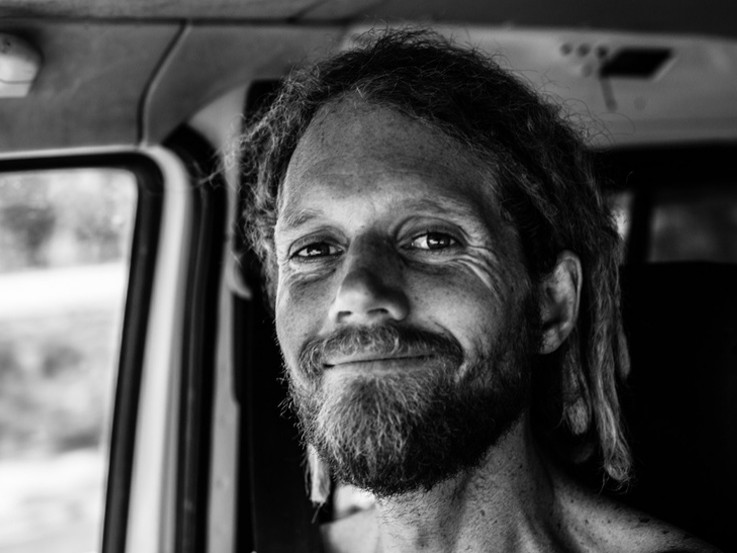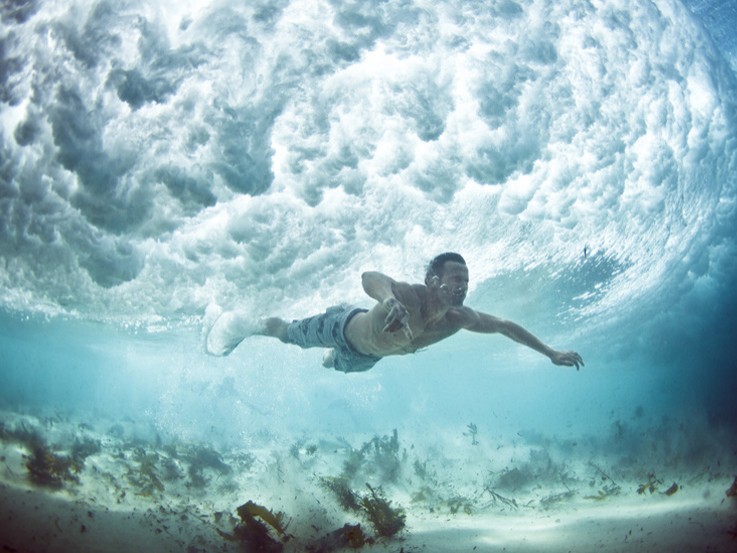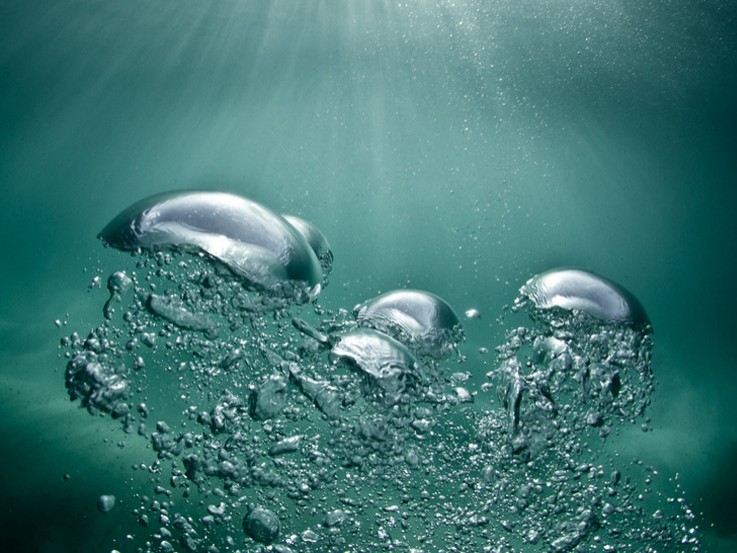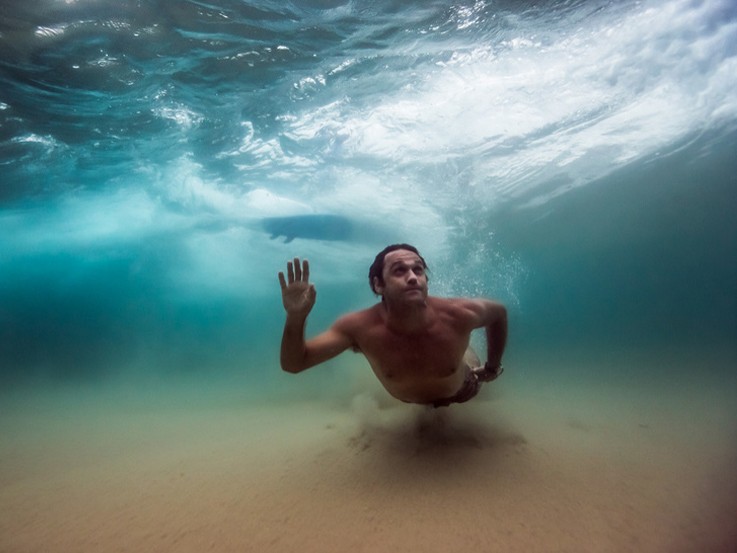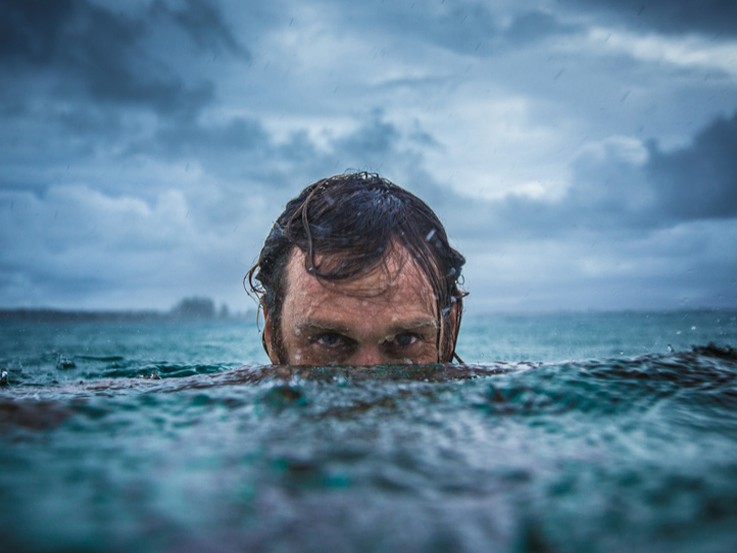Mark Tipple - Surf Photographer
Mark Tipple is a renowned Art Photographer and Documentary Film Maker. Tipple has been working closely with organisations seeking social change in Australia and surrounding countries. His progression has seen the formation of Gallery Project, a concept to sell fine art prints and fund further projects of the organisations he works with. As the principal photographer of The Underwater Project; an ongoing reportage showcasing Australia’s relationship with the ocean, Mark aims to connect the different areas of his work to bring light to stories traditional media shies away from.
His work has appeared in publications such as The Australian, The Telegraph, The BBC, The Independent, National Geographic and Discovery Channel.
So when and where did you first start surfing?
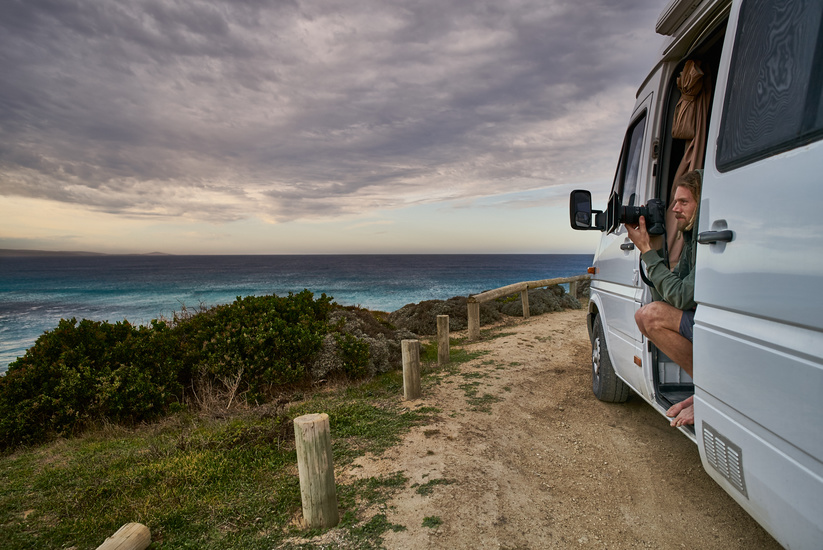
So what is it that you love about surfing and to a greater extent, the ocean?
I think it’s just the freeness that you get when you jump into the water. It's such a cliché, but it really is... Once you're not on land, you get hassled by less people and the only thing you get hassled by are sharks. So once you cut out the people then you just need to deal with the marine environment, which is sometimes easier than people. I'm a bit of a hermit! I've been involved in the ocean for some 25 years and I'm still shit scared of it. Usually, if you're scared of something for 25 years, you're not going to be going back. But the ocean just has that pull that even though you're scared of it, you want to see what it's going to do next. And sometimes it's really blissful and beautiful and calm and other times it just wants to rip your head off. Yes, it's always interesting, always changing.
Have you had any close encounters with sharks?
I made a film on abalone divers for a big company, just two or three weeks ago. We were diving by the Neptune Islands in South Australia. There were plenty of sharks in the area but they didn't hassle us. I had a shark shield on and the abalone diver had his cage. It's actually a bit safer to be under water, especially if you're on the ocean floor. When you're on the surface surfing and that's when the shit happens. We were surfing this one spot up the coast. It was a fair way from any form of town or anything. We were checking one reef and it wasn't that good. So we surfed a little inside reef beside it. A seal came and said hi to us on that inside reef. And then proceeded to swim away to go to the first reef that we checked, and got snatched by a shark right in front of us. We saw the tale splashing, the seal got thrown up into the air and then just disappeared, and obviously we swam in. If we had gone out on that first reef then it could have been us.
Does shark shields work?
Every person I've talked to, like the guys who spend more days than not underwater, they all use shark shields but they don't rely on them. They say they're so small and unobtrusive that you'd be stupid not to have one. However I've heard, I don't know how founded these claims are, that apparently the fields that the shark shield emit actually attracts sharks from far away, but detracts them when they get close. So many of the guys I know take them to the ocean floor. If they see a shark then they'll turn it on. I guess it’s like wearing a seat belt during a car crash. By wearing one it will hopefully give you that 10% more chance of survival than by not wearing one at all.
When did you first get into filmmaking and photography, and what sparked that interest?
I was really into body-boarding in my late teens, early twenties and there wasn't many local-made body-boarding films out there. Obviously, this was before YouTube and everything. So I thought I'd take a camera and film the people I was surfing with and then I could put it all together, sell it and the funds would pay for the next trip. YouTube killed all of that. So, yeah, it was literally just a way to facilitate travel.
Did you study photography?
I studied journalism and then I switched to film. It was a bit more hands-on than journalism was. Studying film helped my photography because it taught me how to tell a story through a picture, through an image. And telling a story is pretty much what photojournalism is.
Do you have a favourite place in the world that your job has taking you?
I believe the one that stands out was the Maldives. I was shooting an environmental documentary on plastic recycling two years ago. We had a budget that allowed us to spend hours filming manta rays and spend time on this amazing luxury yacht. Tanzania is also one of my top destinations. I shot a ton of humanitarian projects there a couple of years ago.
Can you tell us a little bit more about your Underwater Project?
The Underwater Project is basically seeing how people relate to the energy of the ocean. Like I said, I'm pretty shit scared of the ocean at the best of times but I can't take selfies to show that fear or that awe that I feel when I'm in the water. So I started photographing other people when they were diving under waves and being impacted by this energy that is pretty prevalent in the ocean through waves and through swells and currents and stuff. It was just a way to show what I feel in the ocean through other people.
"A haze of smashed blues and whites, the bright sting of sunlight and a briny hit. The wave rolls onwards, lurching forwards with a power that seems so benign from afar. It throws itself in a powerful lunge, crashes down and topples everything in its path – but for the ocean swimmers who know that to survive a wave is to dive deep."
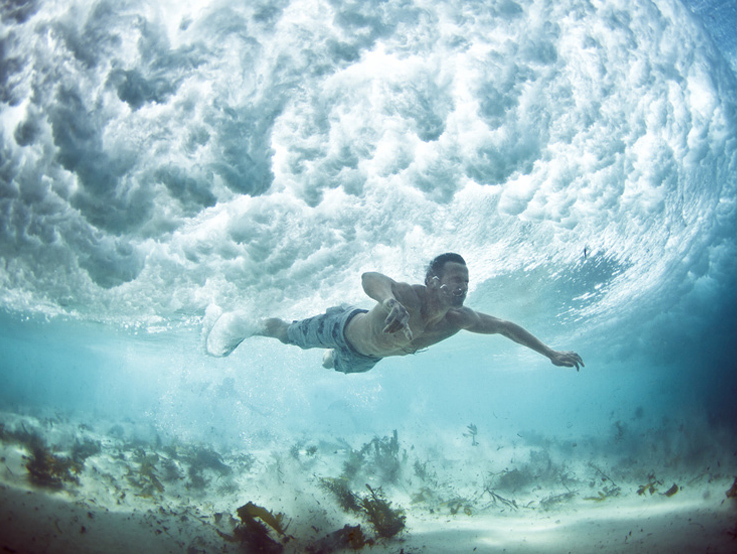
So who or what inspires the work that you do?
Just the ocean really. I really love any photography where the camera is accepted. I used to work for newspapers and follow a lot of the war photographers. The war photographers are going through areas where there’s so much crisis happening that it does not really matter that there’s a camera present. So that unbridled access, it sounds really morbid, that the photojournalists had when they were documenting the scenes, the camera was accepted and they were allowed to shoot freewill.
So it's that work flow that I shoot underwater where I don't make myself obvious. I don't say, "Hey, can I shoot your photo when you dive under a wave?" I just do it. Because no one can see underwater, so it's perfect. So I can be as creepy as I want. I'm just an object and they can't see the camera. However, there was this one guy who was wearing swimming goggles and as he dove under a wave he could see me totally clearly. I don't wear goggles so I could only see his image and my camera's in front of his face. When we came up he said, "Dude, what are you doing?" And I was like, shit, busted, but that looked rad.
So has surfing given you an understanding of the ocean that's been of benefit to your art?
Yes and no. I mean, I don't think anyone can understand the ocean. It always changes, it's got it's own moods. It's like understanding no one can predict the weather, not even the geniuses behind the weather predicting places. The unpredictability has given me a closer relationship with the ocean. There are those elements that you can never control. Which makes it exciting.
What is it that you love about your job?
Working for yourself obviously is pretty rad. I'm not gonna lie. I love to make documentaries and portraits as well. It's really cool to be accepted into someone's life for an afternoon or a day.
Are you working on any new projects at the moment that you can tell us about?
I've really only done commercial stuff for the last six months. This winter I'm planning to do some fun stuff that people can actually like instead of just working with clients. I don't really want to have any agenda. I want to get back into the ocean and see what happens. Just go out, stay open and see what it throws at me.
Who has been your highlight shooting in your career?
I photographed David Attenborough last year. That was a highlight. We made it look like he was walking on water with a split-level concept on the Great Barrier Reef. I also shot Taylor Steele in the same style as the Underwater Project.
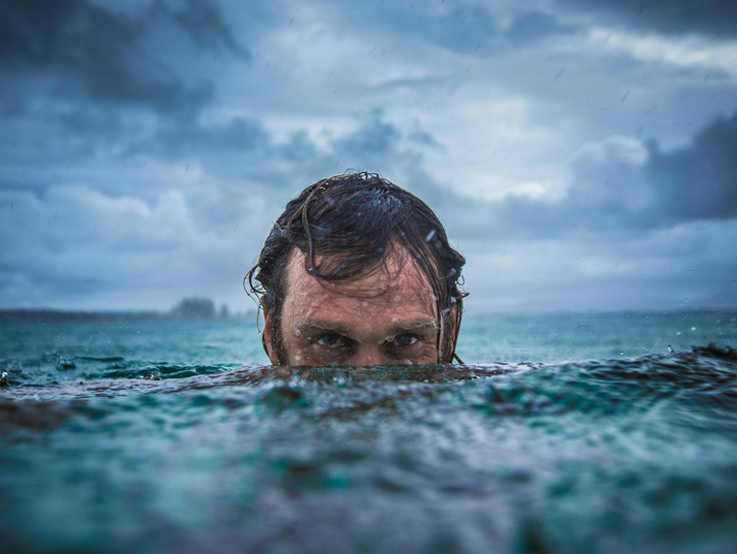
Do you have any advice for photographers looking to find their niche?
Well, to find your niche you have to shoot the shit out of everything. I didn't know my niche and I didn't know what I wanted to do for about eight or nine years. You just literally got to shoot everything that you have an interest in, and then you find what you love to shoot more than the rest of it. You definitely need a niche and you definitely need to keep going with it. It might even take 10 years till someone says, "Hey, that's a cool photo." I think it's a bit of a trap these days with social media being so instant. The old saying, "You need to practice your craft for 10,000 hours," is literally thrown out the window now because you can shoot a photo, put it on Instagram and get twenty likes. You're like, "Sweet, I've made it. I'm a professional." You need to hone your craft. So I think not giving a crap about what other people say about your photos is important.
"Find you passion and keep at it, because if your passion comes through your work, then other people will take notice and then you can get paid to do what you want to do, instead of getting stuck making films about pig farms, like I just recently did."
Where can we find you online?
| Web: | www.marktipple.com |
| Instagram: | @MarkTipple |
| Twiter | @MarkTipple |
Posted by: Christina Niemi, on February 1, 2016
Categories: Interviews
Latest Posts
Craig Sims - White Horses & Surfing Life Publisher
Luke Kennedy - Editor of Tracks Magazine
Simon ‘Swilly’ Williams - Surf Photographer
Jarra Campbell - the Bondi Alchemist
Greg Gordon - Owner of CR Surf
Shayne Nienaber - Surf Photographer
Alexa Hohenberg - Owner of Still Stoked
Christine Deveney - TapaReef Owner & Creator
Russell Ord - Surf Photographer
Richard Kotch - Surf Photographer
Categories
Interviews
Articles
Videos
Press Releases
Quiz
Archive
December 2018
November 2018
October 2018
September 2018
August 2018
July 2018
June 2018
May 2018
April 2018
March 2018
February 2018
January 2018
November 2017
January 2017
December 2016
November 2016
October 2016
September 2016
August 2016
July 2016
June 2016
May 2016
April 2016
March 2016
February 2016
January 2016
December 2015
November 2015
October 2015
September 2015
August 2015
July 2015
June 2015
May 2015
April 2015
March 2015
February 2015
January 2015
December 2014
November 2014
October 2014
September 2014
August 2014
July 2014
June 2014
May 2014
April 2014
March 2014
February 2014
January 2014
December 2013
November 2013
October 2013
September 2013
August 2013
July 2013
June 2013
May 2013
April 2013
March 2013

